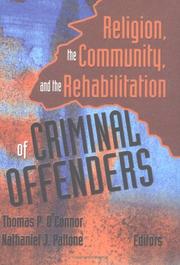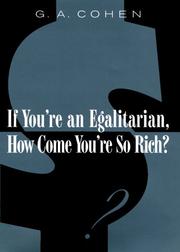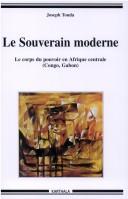| Listing 1 - 10 of 13 | << page >> |
Sort by
|

ISBN: 9780415914055 0415914043 9780415914048 0415914051 9781315022147 9781136666100 9781136666179 Year: 1996 Publisher: New York (N.Y.) Routledge
Abstract | Keywords | Export | Availability | Bookmark
 Loading...
Loading...Choose an application
- Reference Manager
- EndNote
- RefWorks (Direct export to RefWorks)
Religion has long played a central role in many social and political movements. Solidarity in Poland, anti-apartheid in South Africa, Operation Rescue in the United States--each of these movements is driven by the energy and sustained by the commitment of many individuals and organizations whose ideologies are shaped and powered by religious faith. In many cases, religious resources and motives serve as crucial variables explaining the emergence of entire social movements. This book analyzes contemporary social movements which are driven by people and organizations of faith. The essays also address many theoretical issues arising in the study of social movements and disruptive politics.
Social movements --- Religion and social problems --- Religious aspects --- Social action --- Social problems and religion --- Social problems --- Religion and social problems. --- Religious aspects.
Book
ISBN: 128338003X 9786613380036 1400842956 9781400842957 9781283380034 Year: 2012 Publisher: Princeton, NJ
Abstract | Keywords | Export | Availability | Bookmark
 Loading...
Loading...Choose an application
- Reference Manager
- EndNote
- RefWorks (Direct export to RefWorks)
Many scholars and citizens alike have counted on civic groups to create broad ties that bind society. Some hope that faith-based civic groups will spread their reach as government retreats. Yet few studies ask how, if at all, civic groups reach out to their wider community. Can religious groups--long central in civic America--create broad, empowering social ties in an unequal, diverse society? Over three years, Paul Lichterman studied nine liberal and conservative Protestant-based volunteering and advocacy projects in a mid-sized American city. He listened as these groups tried to create bridges with other community groups, social service agencies, and low-income people, just as the 1996 welfare reforms were taking effect. Counter to long-standing arguments, Lichterman discovered that powerful customs of interaction inside the groups often stunted external ties and even shaped religion's impact on the groups. Comparing groups, he found that successful bridges outward depend on group customs which invite reflective, critical discussion about a group's place amid surrounding groups and institutions. Combining insights from Alexis de Tocqueville, John Dewey, and Jane Addams with contemporary sociology, Elusive Togetherness addresses enduring questions about civic and religious life that elude the popular "social capital" concept. To create broad civic relationships, groups need more than the right religious values, political beliefs, or resources. They must learn new ways of being groups.
Small groups --- Associations, institutions, etc. --- Voluntarism --- Social action --- Religion and social problems --- Social problems and religion --- Social problems --- Religious aspects. --- Religious aspects
Book
ISBN: 1282272764 9786613815163 081353948X 9780813539485 0813538351 9780813538358 081353836X 9780813538365 Year: 2006 Publisher: New Brunswick, NJ
Abstract | Keywords | Export | Availability | Bookmark
 Loading...
Loading...Choose an application
- Reference Manager
- EndNote
- RefWorks (Direct export to RefWorks)
In Engaged Spirituality, Gregory C. Stanczak challenges this assumption, arguing that spirituality plays an important social role as well. Based on more than one hundred interviews with individuals of diverse faith traditions, the book shows how prayer, meditation, and ritual provide foundations for activism. Among the stories, a Buddhist monk in Los Angeles intimately describes the physical sensations of strength and compassion that sweep her body when she recites the Buddha’s name in times of selfless service, and a Protestant reverend explains how the calm serenity that she feels during retreats allows her to direct her multi-service agency in San Francisco to creative successes that were previously unimaginable. In an age when Madonna studies Kabbalah and the internet is bringing Buddhism to the white middle-class, it is clear that formal religious affiliations are no longer enough. Stanczak’s critical examination of spirituality provides us with a way of discussing the factors that impel individuals into social activism and forces us to rethink the question of how “religion” and “spirituality” might be defined.
Social change --- Religion and social problems --- Spirituality --- Spiritual-mindedness --- Philosophy --- Religion --- Spiritual life --- Social action --- Social problems and religion --- Social problems --- Religious aspects. --- Social aspects --- Religious aspects

ISBN: 020304956X 1283968509 1136409246 9781136409240 0789019760 9780789019769 0789019779 9780789019776 9780203049563 9781136409387 1136409386 9781136409318 1136409319 Year: 2002 Publisher: New York Haworth Press
Abstract | Keywords | Export | Availability | Bookmark
 Loading...
Loading...Choose an application
- Reference Manager
- EndNote
- RefWorks (Direct export to RefWorks)
Explore the relationship between faith-based programs, religion, and offender rehabilitation! This book reports on current research from several disciplines to help the reader understand the nature and impact of the relationship between faith-based programs, religion, and offender rehabilitation. Religion, the Community, and the Rehabilitation of Criminal Offenders is a unique resource?there has been very little research published on this important topic. President Bush's faith-based initiative recognized that religion plays a role in the justice system and corrections that i
Criminals --- Religion and social problems. --- Religious work with prisoners. --- Prisoners --- Social action --- Social problems and religion --- Social problems --- Reform of criminals --- Rehabilitation of criminals --- Corrections --- Alternatives to imprisonment --- Rehabilitation. --- Religious aspects --- Rehabilitation
Book
ISBN: 9781783488940 1783488948 9781783488957 1783488956 9781783488964 1783488964 Year: 2017 Publisher: London ; New York : Rowman & Littlefield International,
Abstract | Keywords | Export | Availability | Bookmark
 Loading...
Loading...Choose an application
- Reference Manager
- EndNote
- RefWorks (Direct export to RefWorks)
The current refugee crisis sweeping Europe, and much of the world, closely intersects with largely neglected questions of religion. Moving beyond discussions of religious differences, what can we learn about the interaction between religion and migration? Do faith-based organisations play a role within the refugee regime? How do religious traditions and perspectives challenge and inform current practices and policies towards refugees? This volume gathers together expertise from academics and practitioners, as well as migrant voices, in order to investigate these interconnections. It shows that reconsidering our understanding and approaches to both could generate creative alternative responses to the growing global migration crisis. Beginning with a discussion of the secular/religious divide - and how it shapes dominant policy practices and counter approaches to displacement and migration - the book then goes on to explore and deconstruct the dominant discourse of the Muslim refugee as a threat to the secular/Christian West. The discussion continues with an exploration of Christian and Islamic traditions of hospitality, showing how they challenge current practices of securitization of migration, and concludes with an investigation of the largely unexplored relation between gender, religion and migration. Bringing together leading and emerging voices from across academia and practice, in the fields of International Relations, migration studies, philosophy, religious studies and gender studies, this volume offers a unique take on one of the most pressing global problems of our time.
Refugees --- Religion and social problems --- 241.65*3 --- Social action --- Social problems and religion --- Social problems --- Displaced persons --- Persons --- Aliens --- Deportees --- Exiles --- 241.65*3 Theologische ethiek: internationale rechtvaardigheid --- Theologische ethiek: internationale rechtvaardigheid --- Government policy --- Religious aspects --- Réfugiés --- Religion et problèmes sociaux --- Politique gouvernementale

ISBN: 0674029666 9780674029668 0674002180 9780674002180 9780674006935 0674006933 Year: 2000 Volume: 1996 Publisher: Cambridge, MA : Harvard University Press,
Abstract | Keywords | Export | Availability | Bookmark
 Loading...
Loading...Choose an application
- Reference Manager
- EndNote
- RefWorks (Direct export to RefWorks)
This book presents G. A. Cohen's Gifford Lectures, delivered at the University of Edinburgh in 1996. Focusing on Marxism and Rawlsian liberalism, Cohen draws a connection between these thought systems and the choices that shape a person's life. In the case of Marxism, the relevant life is his own: a communist upbringing in the 1940s in Montreal, which induced a belief in a strongly socialist egalitarian doctrine. The narrative of Cohen's reckoning with that inheritance develops through a series of sophisticated engagements with the central questions of social and political philosophy. In the case of Rawlsian doctrine, Cohen looks to people's lives in general. He argues that egalitarian justice is not only, as Rawlsian liberalism teaches, a matter of rules that define the structure of society, but also a matter of personal attitude and choice. Personal attitude and choice are, moreover, the stuff of which social structure itself is made. Those truths have not informed political philosophy as much as they should, and Cohen's focus on them brings political philosophy closer to moral philosophy, and to the Judeo-Christian ethical tradition, than it has recently been.
Equality. --- Distributive justice. --- Social justice. --- Communism. --- Liberalism. --- Religion and social problems. --- Social action --- Social problems and religion --- Social problems --- Liberal egalitarianism --- Liberty --- Political science --- Social sciences --- Bolshevism --- Communist movements --- Leninism --- Maoism --- Marxism --- Trotskyism --- Collectivism --- Totalitarianism --- Post-communism --- Socialism --- Village communities --- Equality --- Justice --- Distribution (Economic theory) --- Social justice --- Wealth --- Egalitarianism --- Inequality --- Social equality --- Social inequality --- Sociology --- Democracy --- Religious aspects --- Moral and ethical aspects --- Communism --- Distributive justice --- Liberalism --- Religion and social problems --- Egalité (Sociologie) --- Communisme --- Socialisme --- Libéralisme --- Political philosophy. Social philosophy
Book
ISBN: 9789089643780 9089643788 9048515254 9789048515257 Year: 2015 Publisher: Amsterdam Amsterdam University Press
Abstract | Keywords | Export | Availability | Bookmark
 Loading...
Loading...Choose an application
- Reference Manager
- EndNote
- RefWorks (Direct export to RefWorks)
When World War II ended, Europe was in ruins. Yet politically and socially, the years between 1943 and 1947 were a time of dramatic reconfigurations that proved to be foundational for the making of today's Europe. This volume homes in on the crucial period from the beginning of the end of Nazi rule to the advent of the Cold War. It demonstrates how the everyday experiences of Europeans during these five years shaped the transition of their societies from war to peace. The essays explore these reconfigurations on different scales and levels with the purpose of enhancing our understanding of how wars end.
World War, 1939-1945 --- Refugees --- Jews --- Peace of mind --- Religion and social problems. --- Social action --- Social problems and religion --- Social problems --- Hebrews --- Israelites --- Jewish people --- Jewry --- Judaic people --- Judaists --- Ethnology --- Religious adherents --- Semites --- Judaism --- Displaced persons --- Persons --- Aliens --- Deportees --- Exiles --- European War, 1939-1945 --- Second World War, 1939-1945 --- World War 2, 1939-1945 --- World War II, 1939-1945 --- World War Two, 1939-1945 --- WW II (World War, 1939-1945) --- WWII (World War, 1939-1945) --- History, Modern --- Civilian relief --- History --- Migrations --- Religious aspects. --- Religious aspects --- world war ii --- Soviet Union
Book
ISBN: 3319679600 3319679619 Year: 2018 Publisher: Cham : Springer International Publishing : Imprint: Palgrave Macmillan,
Abstract | Keywords | Export | Availability | Bookmark
 Loading...
Loading...Choose an application
- Reference Manager
- EndNote
- RefWorks (Direct export to RefWorks)
This book explores the roles of religion in the current refugee crisis of Europe. Combining sociological, philosophical, and theological accounts of this crisis, renowned scholars from across Europe examine how religion has been employed to call either for eliminating or for enforcing the walls around “Fortress Europe.” Religion, they argue, is radically ambiguous, simultaneously causing social conflict and social cohesion in times of turmoil. Charting the constellations, the conflicts, and the consequences of the current refugee crisis, this book thus answers the need for succinct but sustained accounts of the intersections of religion and migration.
Refugees --- Religion and social problems --- Government policy --- Social action --- Social problems and religion --- Social problems --- Displaced persons --- Persons --- Aliens --- Deportees --- Exiles --- Religious aspects --- Religion and sociology. --- Migration. --- Cultural policy. --- Europe-Politics and government. --- Religion and Society. --- Cultural Policy and Politics. --- European Politics. --- Intellectual life --- State encouragement of science, literature, and art --- Culture --- Popular culture --- Religion and society --- Religious sociology --- Society and religion --- Sociology, Religious --- Sociology and religion --- Sociology of religion --- Sociology --- Emigration and immigration. --- Europe—Politics and government. --- Immigration --- International migration --- Migration, International --- Population geography --- Assimilation (Sociology) --- Colonization

ISBN: 2845866585 9782845866584 Year: 2005 Volume: *112 Publisher: Paris: Karthala,
Abstract | Keywords | Export | Availability | Bookmark
 Loading...
Loading...Choose an application
- Reference Manager
- EndNote
- RefWorks (Direct export to RefWorks)
Power (Social sciences) --- Pouvoir (Sciences sociales) --- Africa, Central --- Kings and rulers --- Religion --- Christianity --- Superstition --- Spirit possession --- Religion and social problems --- Magic --- Fetishism --- Social aspects --- #SBIB:39A73 --- #SBIB:39A10 --- #SBIB:39A11 --- Etnografie: Afrika --- Antropologie: religie, riten, magie, hekserij --- Antropologie : socio-politieke structuren en relaties --- Fetishism. --- Magic. --- Religion and social problems. --- Christianity. --- Folk beliefs --- Traditions --- Folklore --- Possession, Spirit --- Experience (Religion) --- Religion, Primitive --- Atheism --- God --- Irreligion --- Religions --- Theology --- Social action --- Social problems and religion --- Social problems --- Magick --- Necromancy --- Sorcery --- Spells --- Occultism --- Fetichism --- Rites and ceremonies --- Worship --- Church history --- Social aspects&delete& --- Religious aspects --- Religion - Social aspects - Africa, Central --- Religion - Social aspects - Congo (Brazzaville) --- Religion - Social aspects - Gabon --- Christianity - Africa, Central --- Superstition - Social aspects - Christianity --- Spirit possession - Africa, Central
Book
ISBN: 9782336008622 2336008629 Year: 2013 Publisher: Paris: L'Harmattan,
Abstract | Keywords | Export | Availability | Bookmark
 Loading...
Loading...Choose an application
- Reference Manager
- EndNote
- RefWorks (Direct export to RefWorks)
Après avoir dressé le bilan de la perte des valeurs éthiques dont souffre la société congolaise majoritairement chrétienne, l'auteur donne des pistes pour articuler le message chrétien avec la culture bantoue et pour ainsi promouvoir une nouvelle évangélisation.
Catholic Church --- Social values --- Eglise catholique --- Valeurs sociales --- Congo (République démocratique) --- Evangelistic work --- Christianity and other religions --- Religion and social problems --- Bantu-speaking peoples --- Social conditions --- 266.1*4 --- 266 <675> --- Missie en niet-christelijke godsdiensten --- Missies. Evangelisatie. Zending--Zaïre. Belgisch Kongo --- 266.1*4 Missie en niet-christelijke godsdiensten --- Congo (République démocratique) --- Social action --- Social problems and religion --- Social problems --- Evangelism --- Proselytizing --- Revival (Religion) --- Theology, Practical --- Discipling (Christianity) --- Religious awakening --- Christianity --- Syncretism (Christianity) --- Religions --- Bantus --- Ethnology --- Religious aspects --- Relations --- History --- Church of Rome --- Roman Catholic Church --- Katholische Kirche --- Katolyt︠s︡ʹka t︠s︡erkva --- Römisch-Katholische Kirche --- Römische Kirche --- Ecclesia Catholica --- Eglise catholique-romaine --- Katolicheskai︠a︡ t︠s︡erkovʹ --- Chiesa cattolica --- Iglesia Católica --- Kościół Katolicki --- Katolicki Kościół --- Kościół Rzymskokatolicki --- Nihon Katorikku Kyōkai --- Katholikē Ekklēsia --- Gereja Katolik --- Kenesiyah ha-Ḳatolit --- Kanisa Katoliki --- כנסיה הקתולית --- כנסייה הקתולית --- 가톨릭교 --- 천주교 --- Evangelistic work - Congo (Brazzaville) --- Christianity and other religions - Congo (Brazzaville) --- Religion and social problems - Congo (Brazzaville) --- Bantu-speaking peoples - Congo (Brazzaville) - Social conditions
| Listing 1 - 10 of 13 | << page >> |
Sort by
|

 Search
Search Feedback
Feedback About UniCat
About UniCat  Help
Help News
News